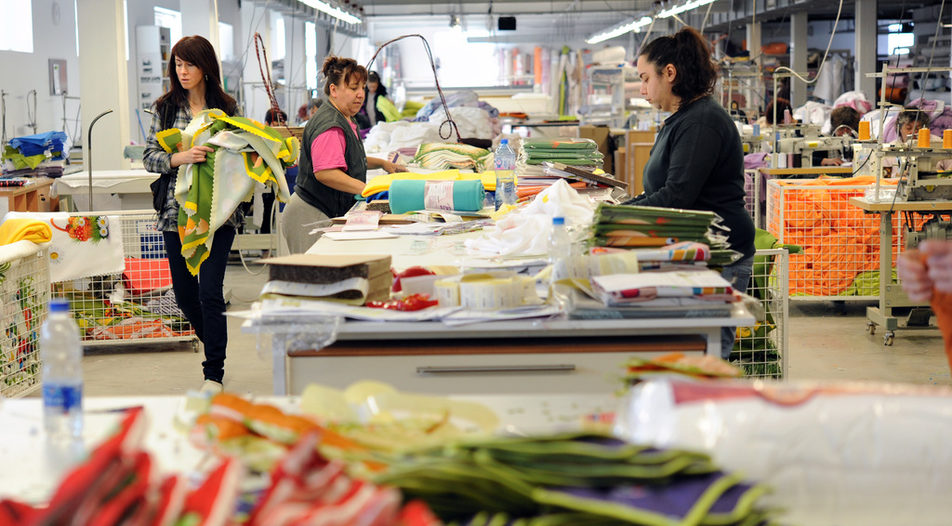The coronavirus pandemic erased half a billion levs of exports of Bulgaria's clothing industry in 2020. Large stocks and full warehouses, postponed sell-offs of previous years' collections, small or nil orders for the next season, delayed payments and chain bankruptcies - these are just some of the problems on the long list of issues experienced by the clothing industry, both Bulgarian and global. The value of unsold clothes in the world due to the extraordinary situation ranges between 140 and 160 billion euro, which is twice the normal volumes, shows an analysis of consulting firm McKinsey.
Bulgaria has a big clothing sector, though it has been gradually shrinking in recent years. Dozens of companies still provide nearly 100,000 jobs and although wages are lower than the country's average, there is no quick alternative. Therefore the decrease in exports by 12% in 2020 and the poor orders this year threaten the industry with a deep crisis. The small new niche of mask and pajama production can hardly fill in the gap.
A few sizes smaller business
Factories in Bulgaria make clothes mainly for foreign contractors, so the export data are indicative of the size of the business. And it is getting smaller. Official statistics show that apparel and textile exports declined 12% yearonyear to 4.06 million levs in 2020.
The biggest drop was seen in the production of T-shirts, cardigans and pullovers, which plunged 20%, or 100 million levs. The sales of men's suits slumped 23% to 328 million levs, and those of women's fell 24% to 333 million levs.
Textile articles were the only exception, with sales doubling to 319 million levs in 2020 on the back of exports of face masks to France, Germany, Belgium and Romania.
Work from home, restrictions on business meetings and events do not encourage purchases of dresses and suits. Another reason for people's low interest in buying new clothes is the decrease in incomes, as some have been left jobless as a result of the pandemic. Coronavirus has boosted online sales but that cannot make up for the losses resulting from closed shops, apparel makers report.
"The clothing sector is in an extremely grave situation. Most companies saw their sales plummet by at least 20% in 2020, year on year. After the first lockdown there were hopes that the worst was over but now there are no more hopes," says Radina Bankova, chairwoman of the Bulgarian Association of Apparel and Textile Producers and Exporters and owner of Lovech- based clothing firm Kris Fashion Industries.
She reports that the sales of her firm, which produces ready-made-clothes under its own brand, dropped 25% on the average in 2020. "When the lockdown was announced in March, we had already sold our autumn/winter 2020 clothes and were preparing the spring/summer 2021 collections. The clothes were produced but they are now in the warehouse, not in the stores, because traders have not sold the winter proposals. We are trying to keep the jobs in the firm, because we are well aware that if we lose our workers now, we will hardly be able to employ them again," Bankova says.
Producers say it is difficult to make projections in a situation like this. "The pandemic measures in the EU vary. Some countries have announced complete lockdowns, others have left the shops open, and yet others close and open them from time to time, which deprives market players of predictability. Companies operate at low capacity and cannot easily organize their commercial activity," Bankova explains.
Thinning margins
Overall, retailers in the EU, where the bulk of Bulgarian exports go to, are cautious and keep small quantities of clothes in stock. The lack of exhibitions and live fashion reviews hampers choice and limits the orders of new collections. And the lack of orders means that Bulgarian factories stay idle.
"The sales of higher-end clothes and suits have been affected the most. Demand for pajamas and tracksuits is booming, which pushes their end prices up but those are niche products and cannot sustain the entire industry. The other enterprises on the whole have no orders and no idea when they will have," Bankova says.
The big quantities of unsold clothes limit new orders. Industry representatives say there are enquiries but only at 'Covid', i.e. lower, prices. The growing prices of raw materials like cotton and the logistic difficulties also pose problems to the sector. "We predict more closed factories and job cuts," Bankova says.
The coronavirus pandemic erased half a billion levs of exports of Bulgaria's clothing industry in 2020. Large stocks and full warehouses, postponed sell-offs of previous years' collections, small or nil orders for the next season, delayed payments and chain bankruptcies - these are just some of the problems on the long list of issues experienced by the clothing industry, both Bulgarian and global. The value of unsold clothes in the world due to the extraordinary situation ranges between 140 and 160 billion euro, which is twice the normal volumes, shows an analysis of consulting firm McKinsey.
Bulgaria has a big clothing sector, though it has been gradually shrinking in recent years. Dozens of companies still provide nearly 100,000 jobs and although wages are lower than the country's average, there is no quick alternative. Therefore the decrease in exports by 12% in 2020 and the poor orders this year threaten the industry with a deep crisis. The small new niche of mask and pajama production can hardly fill in the gap.












